Kareena Kapoor Khan on her cinema, clan, and version 2.0
Kareena Kapoor Khan with mid-day’s entertainment editor Mayank Shekhar at the latest edition of Sit with Hitlist. Pics/Pradeep Dhivar
I think it works for actor Kareena Kapoor Khan to not come across as way too interesting, during interviews—scratching merely the surface, without engaging too hard during a conversation. One, it keeps the mystique alive, for a star-actor, who’s been under the Bollywood spotlight for 23 years, straight.
Also, forget an overpowering intellect, for a second—there is rarely a correlation between an incredibly interesting conversationalist, and an equally fine actor, on screen. In fact, the reverse might often be truer.
Take Kareena, when she’s out with roles far too different from her public image—seamlessly slipping into lives of distant others. She inevitably surprises.
She says, “I have always tried to balance out the stardom/persona, with character-driven films, all through. I was 22, when I did Chameli [2003; that shines a light on a sex-worker’s life, over a night]. Back then, there weren’t mainstream actors attempting such a role. Likewise, Dev [2004], Yuva [2004], Omkara [2006]…”
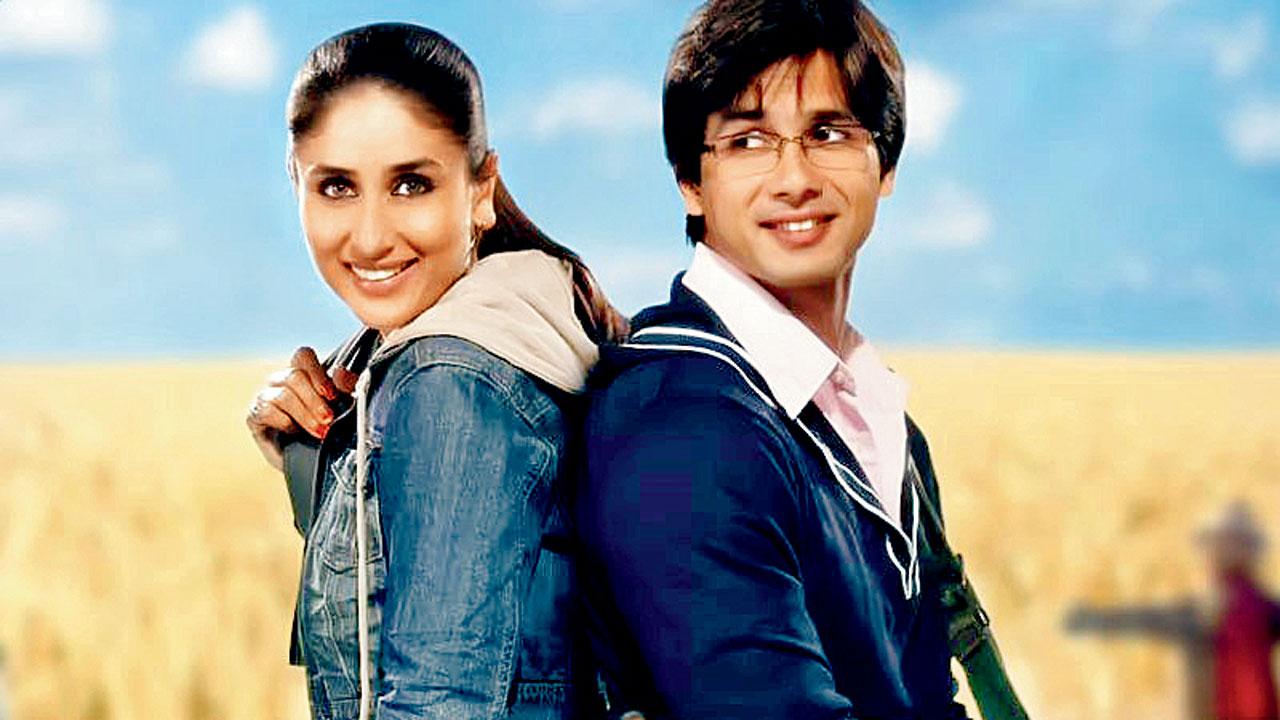
A still from Jab We Met (2007)
At one point, Kareena, 43, reiterates, “Of course, the big-ticket films will be there. But I don’t wanna do stardom anymore. Would rather dig deep into challenging parts.”
This is in context of Jaane Jaan (2023), that she debuted on OTT with, starring alongside Jaideep Ahlawat, Vijay Varma—equally stars in their own right, although from another sky, namely, streaming.
This choice for Kareena was personal: “I binge-watch crime thrillers at home—I’ve watched all of Harlan Coben’s books that have been made into shows on Netflix. So, I always thought that if I come on a streaming platform—it should be in a genre that I would like to see, myself!”
As she also points out, she’s seen Mare of Easttown six times already—and that kinda explains her next release, The Buckingham Murders, that premièred at the British Film Institute festival.
Over three weeks since Jaane Jaan dropped on Netflix—based on the crime thriller, The Devotion of Suspect X—it’s been on the world top 10 chart, for non-English films, on the global platform. Kareena paints a picture of sheer vulnerability in the movie—single-parenting a teenaged girl, while they grapple with an accidental murder.
It’s a whole new world for her, she admits. And the process remains the same. Which is? Mainly to learn your lines, yes: “Because that’s how you can manoeuvre a moment on a set. I’m a prepared actor. But I like to leave room thereafter for the director, co-stars, and the collective energy, that makes a scene and film work. I’m not set in my head.”
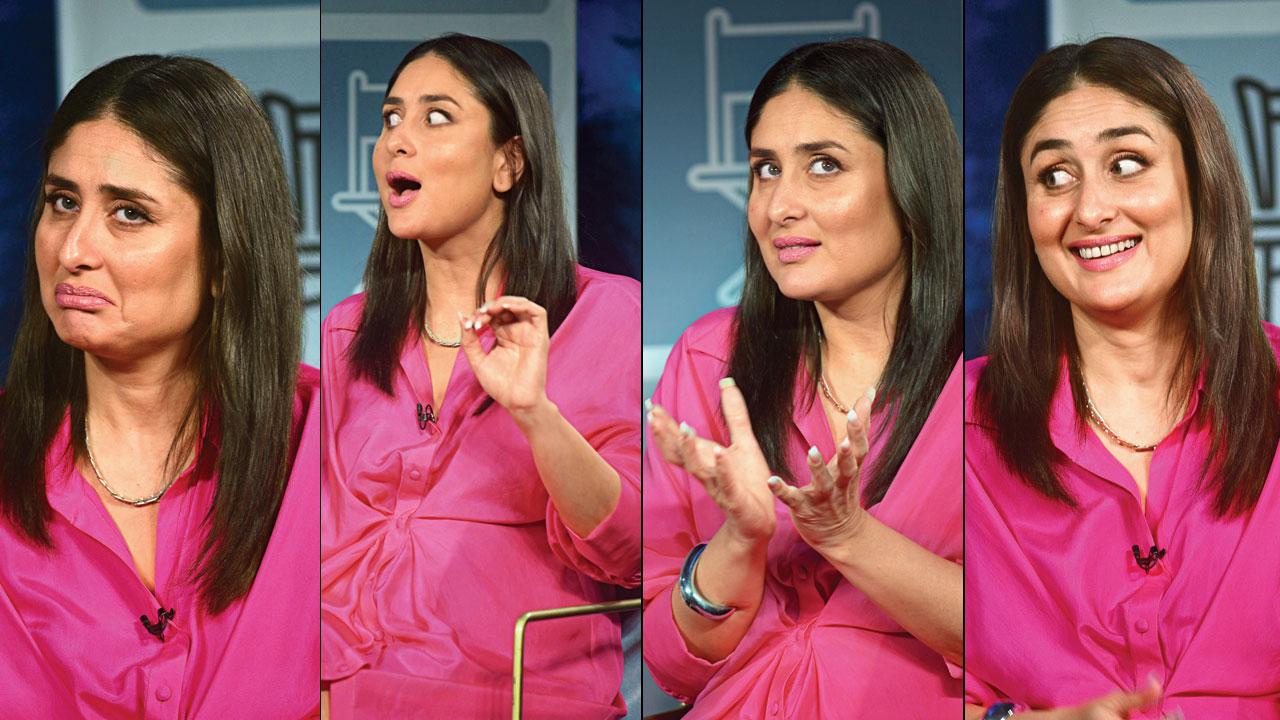
She essentially rubs off the energy in the room, she says. And that, of course, changes from room to room, doesn’t it? With Jaideep as co-star, and the role of Maya, for instance, Kareena says, “You have to be more focused. The [co-stars’] modus operandi is different.”
Which is diametrically different from, say, a Salman Khan film—whether Bodyguard (2011), or Bajrangi Bhaijaan (2015)? “With Salman, you have an actor playing on his confidence, and his super-duper stardom. He is confident to another level.
“And while it may seem so on the set, it’s not like he is unaware, or that he’s not listening, or is kinda sleeping… He’s listening to everything, and is sharp as a knife. Whereas Jaideep is sincere, constantly thinking about his character.”
Over two decades in Bollywood that’s been dominated by the Khan trio, it might be fair to suggest that the female co-star who’s been by their side all along might well be Kareena. Sometimes even picking parts more for the size of the film, than her role. She’s obviously in the best position to define that pop-culture phenomenon more closely.
I ask her to explain the three Khans, ideally through anecdotes, for how they roll, separately. With Shah Rukh Khan, she says, “He’s all those things you hear about him, and more—truly the Shah, or Emperor, or Conqueror, as they say.
“For him, the film is about everybody, who’s on the set—from the co-star, to the light boy on the tarp. You sense none of his stardom, once he’s in front of you, and how he multi-tasks, while making everyone feel special. He’s made of a special cloth.”
Kareena was 21, when she starred opposite SRK in Aśoka (2001): “That was a truly brave film for his maiden home production. He took it all the way to the Venice Film Festival. It’s incredible, the vision for 20 years ahead, that’s he’s had.
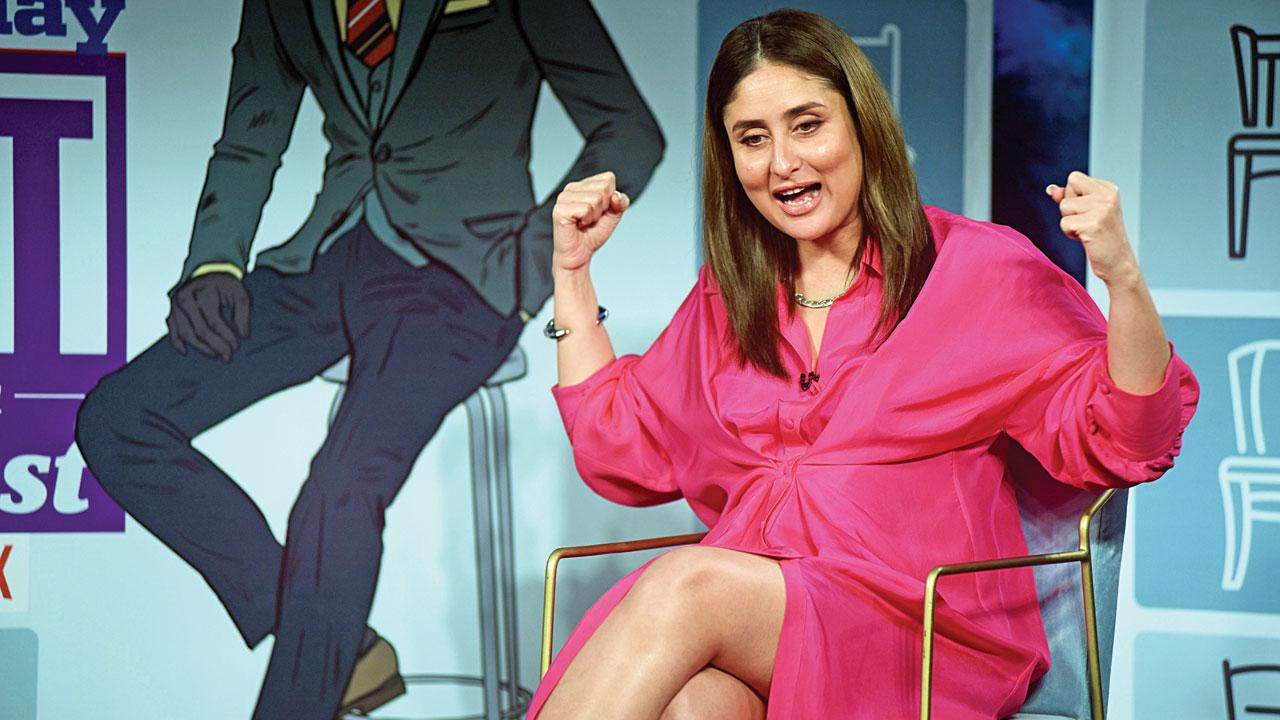
“Back then, he knew that cinema was going to change, and he invested hugely in a VFX studio.” The super-hero film, Ra.One (2011), with SRK and Kareena, was a result of that. As we speak, with Jawan (2023), SRK has made an astounding comeback for himself, and Bollywood itself.
It’s also not far away from the unexpected debacle of Aamir Khan’s Laal Singh Chaddha (2022), which was Kareena’s last release in theatres—a hard labour of love: “With several years of production gone into it.”
Kareena had her second child shortly after the film came out. And she barely had the time or mental space to mull over its commercial failure: “Recently, Aamir and I were at the inauguration of NMACC [Nita Mukesh Ambani Cultural Centre]. That’s when we first met after Laal.
“Well, I saw his face, and I could see how he was looking at me, apologetic and sad, at the same time: ‘What happened?’ Together, we’ve delivered big films, 3 Idiots [2009], Talaash [2012].
“But you know what? It doesn’t matter. I wrote a long letter [on WhatsApp] to both Aamir and the director [Advait Chandan], telling them that our relationships and talent don’t depend on the outcome of a film.”
I wonder if she’s personally analysed what went strikingly south with a movie so sincere and sweet, that the audiences simply stayed away?
“I think it was the post-COVID times. People were looking for some more fun in their entertainment. And Laal Singh Chaddha is dark. Even while we were making it, Aamir discussed with me if we were going too dark with my character, Rupa. I said, no, let it be—that’s what it is.”
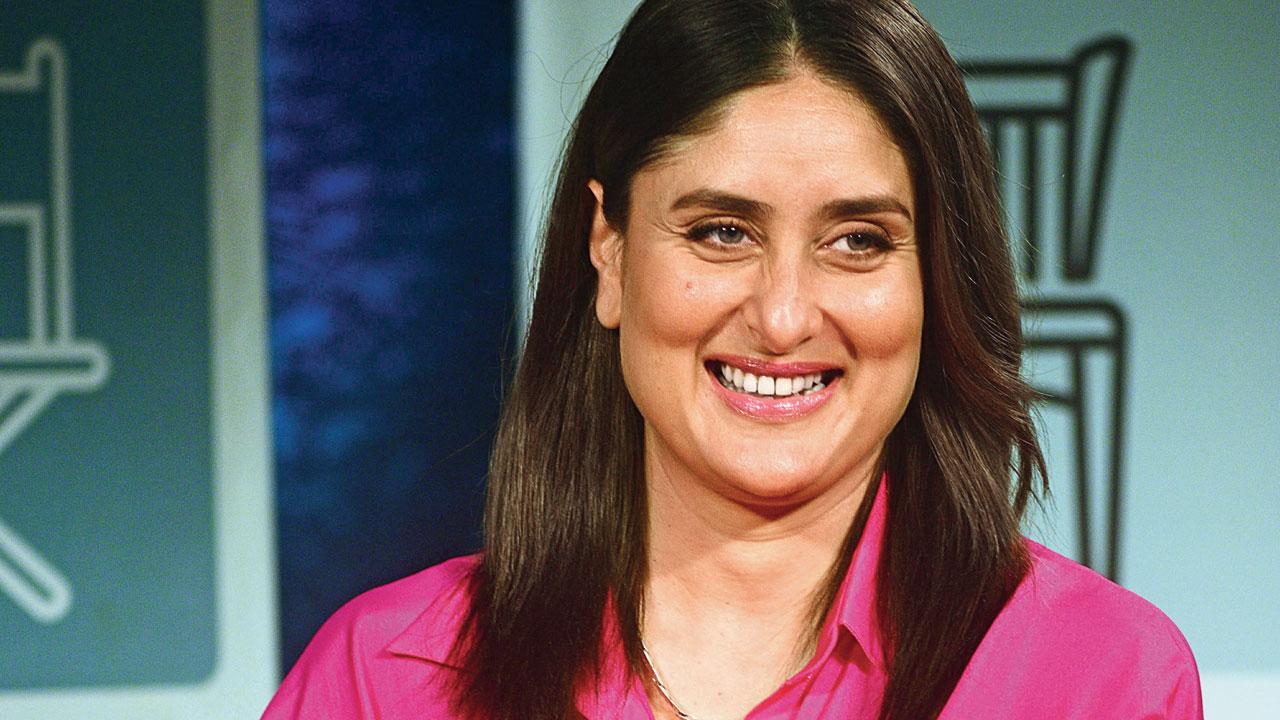
As a Khan co-star, of course, Kareena has the same things to say about Aamir that’s earned him the title, Mr Perfectionist: “He’s too focused on himself; obsessed. Sometimes I’d tell him, ‘Bahut ho gaya yar’.
You can’t do anything else while working on the film—all the conversations and people are centred on one thing. But that’s Aamir for you. And we’ve loved him for that.”
It’s not that I say this because Kareena is before us. The fact is, my favourite Khan for a star-actor is, in fact, her husband, Saif. He’s defined urbane cool in unmatched ways, over a career as long as his Khan
contemporaries.
Also, taking creative risks with subjects that were so OTT, before there were streamers—take the English film, Being Cyrus (2005), for instance. She obviously agrees, “He’s the finest artiste, doing his own thing, a Laal Kaptaan (2019)…”
It must be mildly upsetting, though, that their own pairing wasn’t to the mainstream delight—whether that be Kurbaan (2009): “Hey, Tashan [2008] was a cool flick! It’s got the songs, and characters, and a cult value! So was Agent Vinod [2012], with a cool yet desi intelligent kinda James Bond.” Fair enough.
While Kareena would love to pair opposite Saif, he tells her something rather keenly observant: “Saif says that he wants to be the best in a film. But he loves me so much that he would want me to be the best.” This is a conflict of interest, alright!
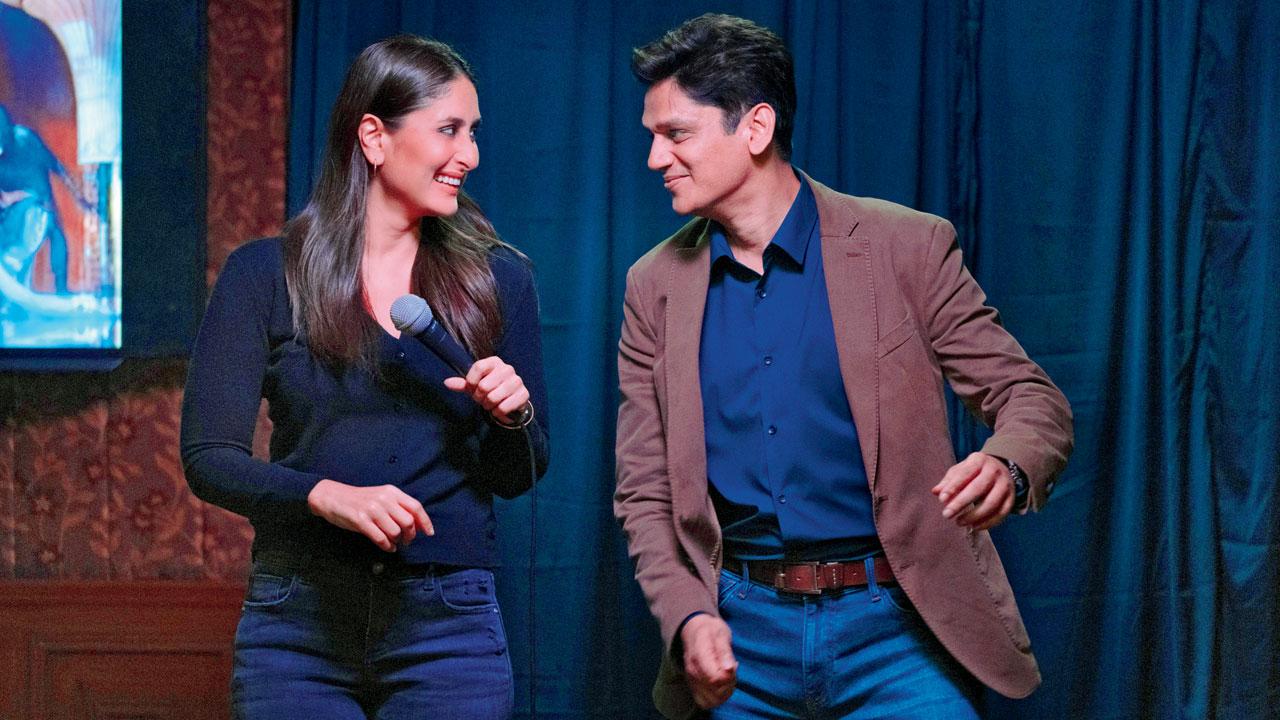
Stills from Jaane Jaan
Kareena’s own filmic story actually begins with her sister, Karisma, who got into the movies, first. Also, the first female from the Kapoor family to show up on screen. She’s a fourth generation actor, from what’s widely considered the first family in Bollywood—her great grandfather Prithviraj Kapoor, onwards.
Still, the fact is, it’s actually her mother, Babita, who raised her, almost single-handedly—the reason she’s in the movies!
Kareena says, “I’ve got my confidence and an independent streak from watching my mom. She’s the lioness, who raised the cubs, that is my sister and I. The fire in me comes from her, and she has the same fire for her children even now, when we discuss work.
“Three women under one roof can do anything! That’s how she took on the world and pushed Karisma’s career. She personally took her down South, to meet Rama Naidu.”
Ah, that’s how Prem Qaidi (1991) happened! Remember, Harish? Also, Anari (1993)! With Telugu superstar, Venkatesh, who’s also found a new audience, you would’ve noticed, with the recent Netflix series, Rana Naidu.
Babita was the ‘Bollywood mom’, as was the prevalent practice in the ’90s: “She would always be with my sister. By the time, I made my debut, times had changed. She wouldn’t come on the set with me. She adapted with the new generation. Also, cinema changed from the ’90s.”
Kinda crappy decade the ’90s were, for mainstream female actors, no? I prod Kareena. She says, “Well, everybody still dances to Lolo’s songs at parties!”
Either way, it’s worth noting that up until the end of that decade, while producers and stars in Bollywood were only too happy to introduce their male children into films, they resolutely chose to keep their female progeny at a safe distance.
Clearly, something was amiss? That they didn’t think the film industry was a great place to work for women? Kareena is decidedly non-committal: “I think these were personal decisions. [With the Kapoor family], it could well be that light-eyed actresses don’t make it!
“In the ’60s and ’70s, it was simply a choice they made. My mom-in-law [Sharmila Tagore], for instance, continued to work after marriage, and even after Saif was born. She was a game changer of sorts.”
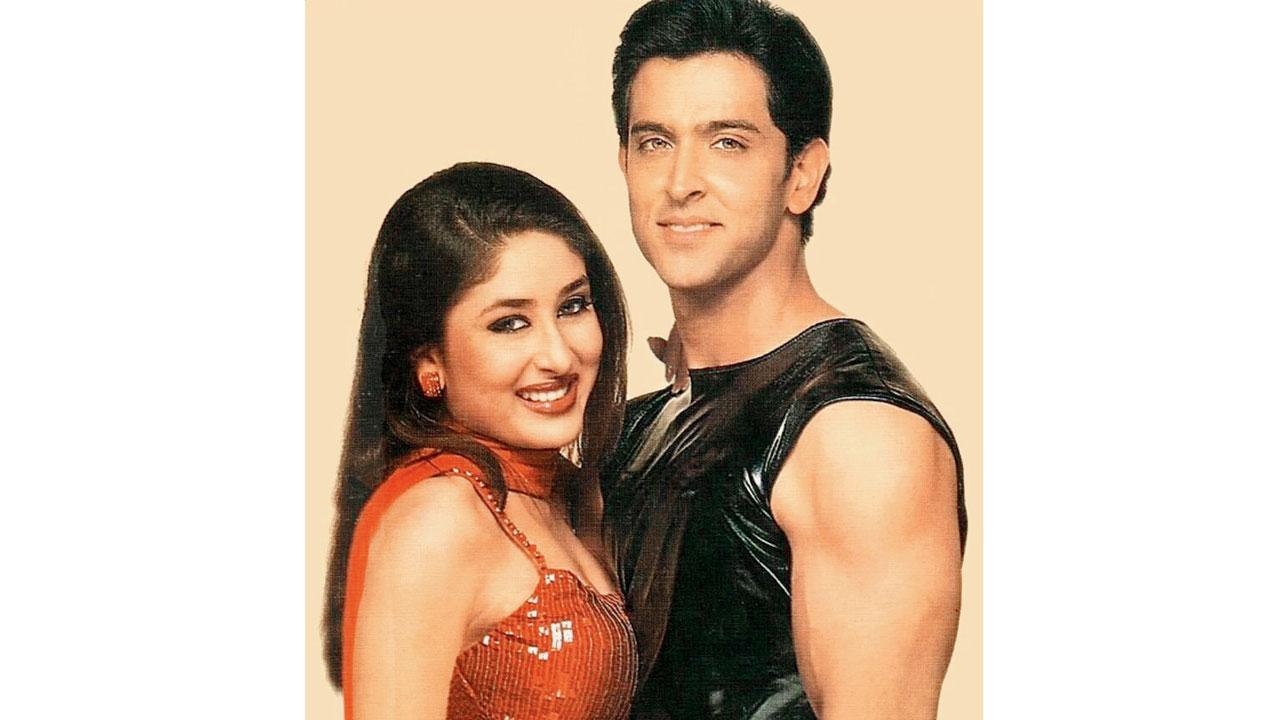
Kabhi Khushi Kabhie Gham (2001)
Even with Karisma, Kareena recalls her father, Randhir, “an open-minded cosmopolitan”, was clear: “Lolo would have to find her own way, and that he can’t help her [vis-à-vis a debut/launch vehicle].”
Lolo, being Karisma’s popular nickname. It’s derived from Italian actor-model, Gina Lollobrigida, Kareena confirms: “Now, I don’t know where Bebo [Kareena’s own nickname] comes from!”
She’s however named after Leo Tolstoy’s Anna Karenina, the novel Babita was reading, when she was pregnant with Kareena. Okay, another legend confirmed then. Has she read the book she’s named after?
“Have you seen the size of the book? Mere baal safed ho jayenge [I’ll grey, before I finish it!]. It’s lying at home. Guess who’s obviously read it!” Meaning, her husband, Saif, who’s more of a reader.
“Well, I may give off the vibe that I’m not a reader, which is not true. I do read, but more [in the crime fiction space] Scady [Scandivanian] stuff, like Joe Nesbo. Saif has a different taste, having been an art history student.”
Speaking of names, her new title, Jaane Jaan, is actually named after a film, starring her father, Randhir—who, I tell her, and not because she’s around, that he’s one of my favourite Kapoors, definitely underrated. Her own favourite Randhir films are the same as mine—on top, the crazy comedy, Biwi-o-Biwi (1981), then Chacha Bhatija (1977), which is before Kareena was born.
And that would be true for Randhir’s own stardom, that was quite something in the ’70s, and but it faded by the ’80s: “I was too young, when my dad had stopped working, as such. That’s why my mom had to step in to bring us up, and figure out the odds and ends, until Lolo started working. He did direct two-three films [Heena was one of them]. But he’s had a sporadic kinda career.
“He’s actually loved living life, a lot more—he’s a funny and warm man, with a large social circle, meeting close friends... There are a hundred of them. And they would have not one thing wrong to say about him. He gave more time to that side of his life. It’s something I’ve learnt to do with my circle as well. He’s given us a lot of love.”
The other thing that’s seeped into her personality is a middle-class upbringing, therefore: “My mother came from a humble background. Her father was a character actor, Hari Shivdasani. My grandmother was British. They met on a tour in the 1940s. Growing up, it was clear, that we would be provided the bare necessities. I could buy [expensive] clothes and other stuff, once I got a job.”
Karisma debuted at 15; Kareena, at 20: “My 20s weren’t about partying, shots, nightclubs... They got spent at Mehboob Studios. And I loved that! And it’s been my life since—early to bed, by 9.30 pm, up early. You’ll hardly find me at film parties, although I can have a late-night, once in a while.”
Once you start checking boxes, you realise, Kareena actually has a new-age doppelgänger. An actor who met and clicked with her husband (later), similarly, on a film set, having known him for years before that.
With a maternal grandmother, who’s British, while her paternal family is from the films. She broke out with a Karan Johar film. As did Kareena, in many ways. And now, they’re also related. That’s Alia Bhatt, who confesses to being Kareena’s biggest fan. It may appear she has modelled herself on her as well.
Kareena smiles, “She’s tried to keep that artistic balance. I’m a huge admirer of her choices. And that’s what ultimately makes an actor. I didn’t know her as a child.
But of course, now Alia’s part of the family [married to Kareena’s cousin, Ranbir]. Recently we had a picture together that got everyone talking about how we must work together. And then Karan [Johar] started getting the same messages. The onus is on him to cast us then!”
Easily, the role that got Kareena pop-culture cred was as Poo, short for Pooja (as all Sidharths are Sids, and Adityas, Adys). It’s the snobbish fashionista’s role from Karan Johar’s Kabhi Khushi Kabhie Gham (2001) that got her all the teenage love: “I think the lingo and the language of the character is even more relevant today! The reason it worked was because I had so much fun playing the part—a rare mainstream, female role [that stands out] in a film full of [male] stars.”
As you can tell, it was inspired by Alicia Silverstone from Clueless (1995). Kareena had obviously seen that teen-com: “But, no, I was totally inspired by Karan. He just knew the part really well.” Looping back to the Alia-Kareena potential casting by Karan—if that does happen, I joke, it’ll fire up online trolls screaming, nepotism all over again!
Kareena sighs, “Now, what nepotism, yar! I’ve been around for 23 years. People have seen my fair share of debacles. And I’ve proven myself. I keep coming back.”
What can’t be denied, however, is the edge, in any profession, for that matter, that one enjoys, by observing it from a close distance, being raised around it. As with films too.
She agrees, “For me, that happened with being on Karisma’s sets, growing up. I was lucky, yes. But the first time you face the camera is still the first time. And there is an X factor that you can’t take that away from someone. So, what you’re referring to is just a one percent advantage.”
Kareena debuted with a relatively broody/artsy, Refugee (2000), with Abhishek Bachchan, after dropping out of Hrithik Roshan’s debut, Kaho Naa Pyaar Hai (2000). K3G cemented her stardom of sorts. Refugee was a fair starting point for her displaying her chops as a sensitive/sensible lead.
What followed was a series of films that would baffle the moviegoer—take the forgettable Yaadein (2001), or Main Prem Ki Diwani Hoon (2003), among many that you rightly can’t recall.
Both the movies mentioned, she points out, were by the star-filmmakers of the time—Subhash Ghai, Sooraj Barjatya. Was she picking directors over scripts? “I was too young then. You can’t say no [to such big films]!”
An actor, of course, only acts. There is much else at play for her to take full responsibility for a role, let alone an entire film. At some point, given the offers, she had decided on a sabbatical, refusing to sign up any: “I was saying no to some of the biggest movies.” She’s quite well-known for that too. Take Queen (2013), I remember. She’d passed on that as well.
“Oh, no, that’s much later,” Kareena says, talking of the late noughties. How did she plan on reviving her career then? “With a ripped, six-pack, planning to blow up with the world, walking on high speed [shot], on to the big screen! I hadn’t worked for a year and half.”
The film? Tashan! The goal? Size zero! As goes the old John Lennon cliché (which like all clichés, being true)—life is what happens, when you’re busy making other plans.
Actor Shahid Kapoor sent over director Imtiaz Ali for a script narration. Imtiaz had only debuted with Socha Na Tha (2005). She hadn’t seen that film. Shahid had. She was happy with his script. Jab We Met was born. Rest is history, and chemistry, of course. But all through the making of Jab We Met, Kareena says, she wouldn’t stop talking about Tashan!
“Imtiaz just kept saying, ‘I don’t think you’re getting it!’” In terms of the impact her character is likely to have. It did. Kareena as Geeta remains her most prized picture yet.
Although my personal favourite, in terms of performance alone, is Kareena as Aaliya, in Govind Nihalani’s Dev, based on the 2002 Gujarat riots. It’s the role with immeasurable depth you wouldn’t expect Kareena (or any other commercial/mainstream star) to pull off, so effortlessly. That’s the visceral, surprise element she brings to the screen, that’s hard to decode about her, least of all in a press interview.
Beyond movies, her hugest production is obviously her son, Taimur, a media blockbuster ever since he was born. And which also explains nepotism more realistically—it starts with intense public interest in star-children, in general.
Something that social media and paparazzi feed on. Taimur’s been India’s most famous child, way before he’s likely to even contemplate his profession.
There’s little Kareena could do about it: “If he’s with me, he will be photographed.” I wonder how other celebrity couples manage their child’s privacy. Nobody, for instance, knows what Rani Mukerji and Aditya Chopra’s kid looks like. There must some method to it.
It can backfire too, Kareena reasons, “I could cover his face. That would be more scarring.” Infant Taimur even had a weekly column with his name for a pseudonym in a popular Mumbai daily. I wonder if he’s seen it?
“He hasn’t. But I’m sure he will, if he googles himself.” His growing up could be a curious case study on fame, while his mother claims he’s been totally unaffected by the unwanted attention: “He’s a smart boy. He knows that he has famous parents. And that’s what this is about.”
None of which Kareena had to face, through school/college (Jamnabai, Welhams, Mithibai), while being a celebrity child herself. And she’s been a Bollywood star since teenage. All through which she’s seen the media landscape evolve, equally. Back in the noughties, the reporting around film stars were inevitably about catfights in fanzines and gossip rags!
She was then in her 20s, a decade she regrets a little for “saying and doing foolish things, in order to prove oneself.” These would make it to the press, covering movies, that was still aimed at a niche readership—“Kareena, Priyanka in a catfight in Antwerp!” Okay, that’s not a true story, apparently.
The smart phone and social media turned everyone into a semi-paparazzi and gossip writer. It gets to Kareena, at times: “Everyone wants your time, and a piece of you, which wasn’t there before. It’s tough to balance this out—to not have a bad day, or be tired, being under the spotlight 36 out of the 24 hours of your day!”
An old, 2019 video, featuring N Narayanmurthy, for instance, randomly went viral recently. Wherein the Infosys founder talks about Kareena as his co-passenger on a flight once. And that he wasn’t pleased with her fobbing off unnecessary attention from the public around her. Narayanmurthy’s wife, Sudha Murthy, is a voice of reason in that video. She tries to explain Kareena’s POV. Something Kareena does well herself.
Only, that since everything becomes controversial for a day, online—I can see Kareena’s entourage dancing behind her to cut short the interview, while I wonder if she’s opened up enough?
They’re unhappy with the questions, they complain to my colleague, during the interview. Which is strange, and it’s never happened during our conversation series, Sit with Hitlist, over five years.
The same thing occurred during Kareena’s The Guardian profile, more recently (as noted in the piece). She is actually eloquent enough to take her questions, with absolute ease, and reasonable charm. It’s hard to figure why her own/personal team would unusually attempt bad press towards the employer/client!
 Subscribe today by clicking the link and stay updated with the latest news!" Click here!
Subscribe today by clicking the link and stay updated with the latest news!" Click here!








